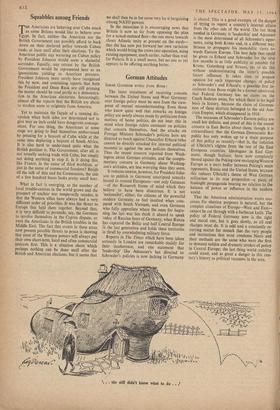German Attitudes
SARAH GAINHAM writes from Bonn:
The latest instalment of recurring concern between the United States and West Germany over foreign policy must be seen from the view- point of mutual misunderstanding. Even those who know quite well that remarks on foreign policy are nearly always made by politicians from motives of home politics, do not bear this in mind when foreign rulers comment on policies that concern themselves. And the attacks on Foreign Minister Schroeder's policies here are directed as much against Chancellor Erhard (who cannot be directly attacked for internal political reasons) as against the new policies themselves. Thus the recent concern reported from Wash- ington about German attitudes, and the comple- mentary concern in Germany about Washing- ton's attitudes, are less worrying than they seem.
It remains unwise, however, for President John- son to publish in Germany unscripted remarks bound to remind Europeans—not only Germans —of the Roosevelt frame of mind which they believe to have been disastrous. It is not 'nationalist', either, for citizens of the powerful modern Germany to feel insulted when com- pared with South Vietnam, and even Germans who fully appreciate where the onus for begin- ning the last war lies think it absurd to speak today of Russian fears of Germany, when Russia has captured the Baltic and half Central Europe fit the last generation and holds these territories in thrall by overwhelming military force.
Reports in The Times which have been taken seriously in London are remarkable mainly for their incoherence, and one statement that 'leadership' like Adenauer's but directed to Schroeder's policies is now lacking in Germany is absurd. This is a good example of the danger of trying to report a country's internal affairs from the other side of the world. The last thing needed in Germany is 'leadership' and Adenauer is the most determined of all Schroeder's oppo- nents, using both Krone and, in a different way, Strauss to propagate his immobilist views to- wards Eastern Europe. The best help that could be given to Erhard and Schroeder for the next few months is as little publicity as possible for Krone, Gutenberg and Strauss, yet to do this without underestimating the latter's possible future influence. It takes time to prepare opinion for such important changes of policy as Schroeder's and Erhard's; a possible first in- stalment from Bonn might be a formal admission that Federal Germany has no claim on the Czech Sudeten areas, for which there is no legal basis in history, because the claim of German- ness of these districts belonged to the old Aus- trian Empire, which disappeared in 1918.
The successes of Schroeder's Eastern policy are small but definite, and proof of this is the recent concern in East Berlin about them, though it is extraordinary that the German Democratic Re- public has only woken up to a main purpose of this policy so recently—that is, the isolation of Ulbricht's rdgime from the rest of the East European countries. Ideologues in East Ger- many, though Stalinist, have now completely turned against the Peking view envisaging Western Europe as a mere buffer between Peking's main opponents, Russia and the United States, because this reduces Ulbricht's theme of West German militarism to its true proportion—a piece of hindsight propaganda bearing no relation to the balance of power or influence in the modern world.
That the American administration wants suc- cesses for election purposes is natural, but the complex situations of Europe—West and East— cannot be cut through with a barbecue knife. The policy of Federal Germany now is the right and moral one, but it goes slowly, as all real changes must do. It is odd and a constantly re- curring matter for remark that the very people and institutions that most condemn Nazis and their methods are the same who were the first to demand sudden and dramatic strokes of policy. in Central Europe; the last thing world stability could stand, and as great a danger in this cen- tury's history as political vacuums in the area.
4. .she still didn't know what to do . .






























 Previous page
Previous page